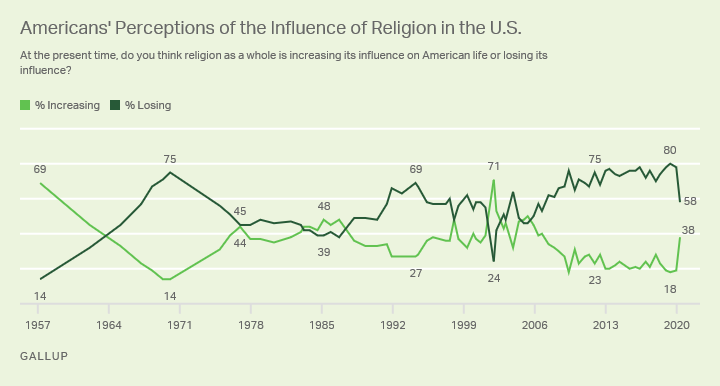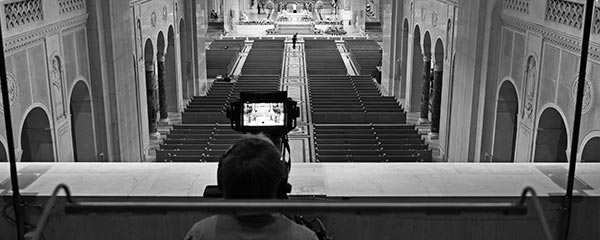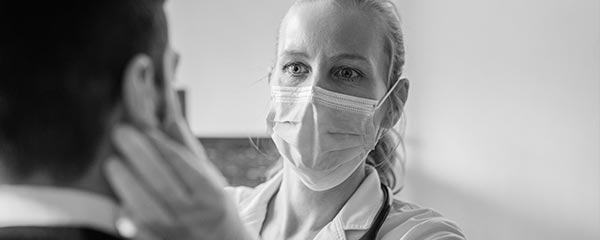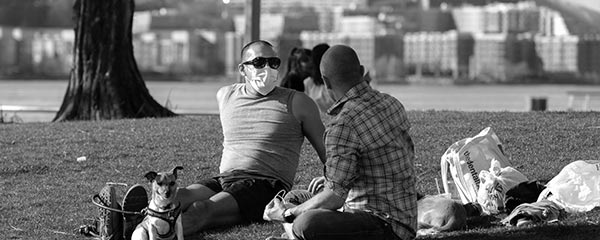We are seeing an interesting paradox in our recent data on religion in the age of the coronavirus. Americans have become significantly more likely to say that religion is increasing its influence on American life, but there is no actual evidence of an uptick in religiosity at the individual level.
Specifically, the percentage of Americans who say religion is increasing its influence on American life has jumped from 19% last December to 38% in Gallup's latest April 14-28 survey.

The results of this change are not dramatic in an absolute sense. The 38% who now say that religion is increasing its influence is still less than a majority -- and by way of comparison much lower than measured by Gallup after the 9/11 terrorist attacks. In December 2001, 71% of Americans said that religion was increasing its influence on American life, the highest ever recorded across Gallup's six-decade trend.
But the current "increasing its influence" figure is double what we recorded last year and the highest since 2006, when in September of that year 40% said the influence of religion was increasing. The all-time low in response to this question, which Gallup first asked in 1957, was 14% in 1969 and 1970.
Measures of Americans' Personal Religiosity Very Stable
Despite the uptick in views that religion is increasing its influence in society, we don't find evidence -- yet -- of an actual increase in the influence of religion at the individual level. In other words, while more Americans perceive that religion is increasing its influence, the reality does not appear to match those perceptions.
I recently reviewed new Gallup data on self-reported church attendance and prayer, and concluded that while worship has largely shifted to virtual venues, it isn't any more or any less prevalent now than it was pre-virus. The same goes for our estimate of prayer behavior.
Other Gallup trends from our April 14-28 update show similar stability. There is no change in Americans' reporting that religion is very important in their personal lives, no significant increase in the percentage of Americans who have a religious identity (as opposed to being a "none" with no self-reported religious affiliation) and no change in the percentage of Americans who say that religion can answer all or most of society's problems.
What's Behind the Rise in Those Saying Religion's Influence Is Increasing?
Gallup's trend measure of religion's influence on society ("At the present time, do you think religion as a whole is increasing its influence on American life or losing its influence?") asks Americans to speculate about what is happening across the country, rather than in their own personal lives and in their own personal beliefs.
Americans don't have an available and accurate way of assessing the influence of religion across the entire country. So respondents in our survey, we can assume, are either relying on what they have read, seen or heard from others (including news coverage), or they're making assumptions about what they think could or should be happening.
We didn't ask Americans directly if religion is increasing or decreasing its influence on their own lives. But a recent survey by Pew Research did ask Americans a variant of this: "As a result of the coronavirus outbreak, has your own religious faith become stronger, weaker, or hasn't changed much?" The results show that 24% say their faith has become stronger, 2% weaker -- with the rest saying there has been no change or that the question wasn't applicable because they weren't religious to begin with. In short, almost four in 10 Americans assume that religion is increasing its influence in general, and about a quarter report an increase in personal religious faith. That's despite the fact that our Gallup data show no actual increase in religiosity across several trend measures.
How is this the case? I think a primary explanation is provided by an analysis showing that the majority of those who say that religion is increasing its influence, both nationally and personally, are those who were already religious.
A detailed look at our Gallup data shows that Americans who themselves are personally religious are most likely to have increased their perceptions that religion is becoming more influential in American life. This is based on a comparison of the results of our question among groups defined by their religiosity in our December 2019 survey and in the current April survey.
- The percentage saying religion is increasing its influence went from 23% in December to 49% today among Americans who say religion is very important in their personal lives. But among those who say that religion is not important in their daily lives, the jump has been much more modest, from 19% to 25%.
- Similarly, among Americans who report attending church frequently in each survey, the "increasing its influence" figure has gone from 23% to 45%, compared with a smaller 21% to 31% uptick among those who never attend church.
Pew's analysis, similarly, found that the increase in those who said their religious faith had become stronger was mostly among those who -- based on previous measures of church attendance -- were already religious. Thus, the crisis apparently has reinforced faith among the already faithful, and they -- perhaps naturally enough -- assume that this means religion is having a greater influence nationwide as well, as reflected in Gallup's trend.
Yet, as I've discussed, when it comes to direct questions about personal religiosity, we have seen no change between last year and the current survey. This most likely reflects two factors. First, even if the personal faith of already religious Americans has deepened in recent months due to the virus situation, it can't be reflected in our normal trend measures because these people were already at the top of the scales used to measure religiosity. Second, there apparently has been no appreciable uptick in religiosity among the less religious -- those who could have, in theory, responded in more positive ways to the religious trend questions, but did not.
There still may be other explanations for the difference in views of religiosity across the country and actual trends of religious behavior measured at the individual level. Americans who say that religion is increasing its influence on American life could be referring to religion's impact on political leaders (rather than on individuals), or its influence in other ways not measured by our standard religion trends.
Same Relationships After 9/11
It is important to note that we saw the same differences in perceptions of changes in religion across the country and reports of personal religiosity after the 2001 terrorist attacks. By December of that year, some three months after the attacks, 71% of Americans said that religion was increasing its influence on American life. This, as noted, was the highest in Gallup history and may have in part reflected the many public references to God and prayer that occurred after 9/11. Yet, as I reviewed then, the actual individual-level evidence, as is the case in the current situation, showed no significant increase in self-reports of church attendance or in reports of the importance of religion in one's daily life.
In sum, national crises such as 9/11 and coronavirus may deepen the faith of the already faithful, but there is no evidence that they widen the impact of religious faith on the population as a whole.




